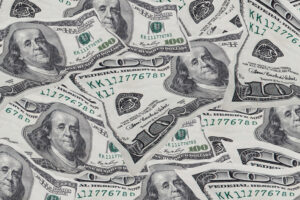Inflation Is A Monetary Curse
The comments below are an edited and abridged synopsis of an article by Alasdair Macleod
In a speech on monetary policy given at the Jackson Hole conference recently, Fed Chair Jay Powell never mentioned money, money supply, M1 or M2. With money supply expanding at a record pace to fund both QE and intractable budget deficits, the omission is extraordinary.

The FOMC (the rate-setting committee) no longer seems to take the consequences of monetary expansion into account. But the fact is that rising consumer prices caused by monetary expansion have driven real rates sharply negative and are leading to pressure for higher interest rates.
This article looks at the consequences of policies that combine the maintenance of a wealth effect by juicing markets with QE, and funding enormous government deficits, which are now beyond control. A flight out of foreign-owned dollars and dollar-denominated financial assets, which currently total over $32 trillion, is becoming inevitable.
Will the Fed respond by increasing its QE support for financial markets while resisting the pressure of rising interest rates? If so, there is no surer way to destroy the dollar.
The lessons from history combined with sound economic analysis tell us that markets will reassert themselves over the Fed, and for that matter, over all other central banks that have embarked on similar monetary policies.
Gold is the ultimate hedge against these events and their consequences.
Up for discussion: Introduction; the relationship between prices and money; fund raising for the government is about to become chaotic; the effect on the dollar; rising bond yields driving bear markets; the John Law precedent; and gold.
